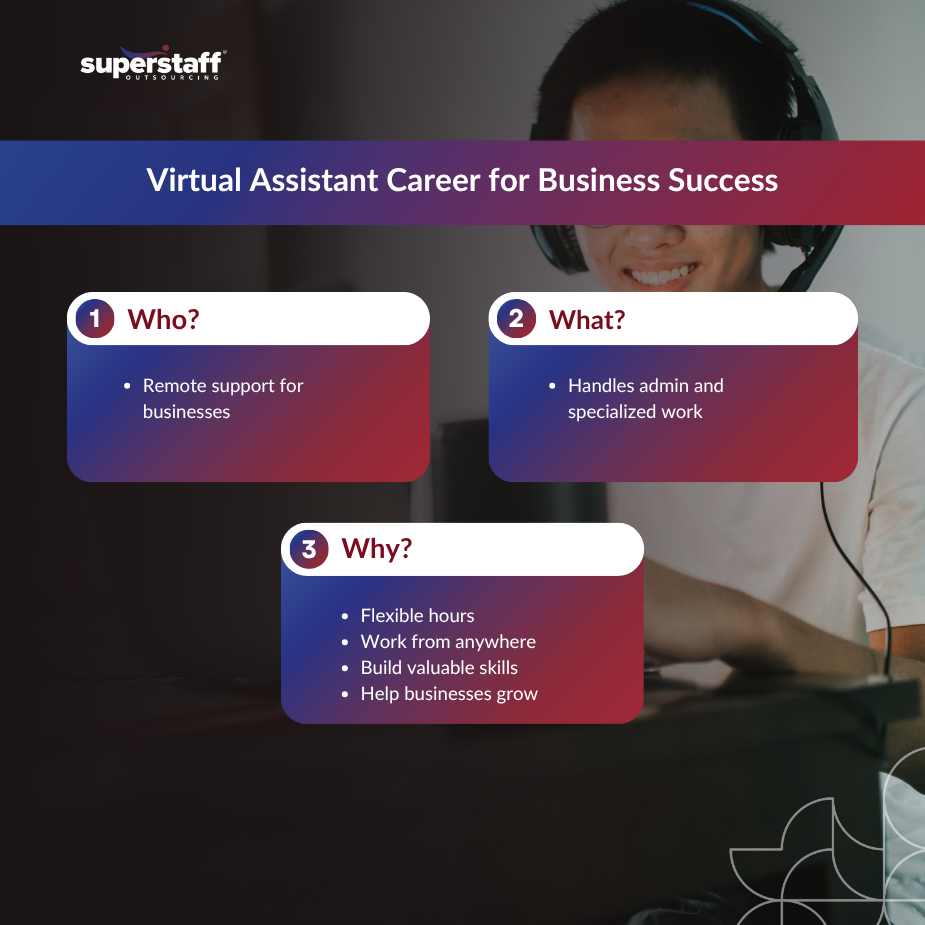
Remote work has opened new doors for people looking for flexible income opportunities. One of the most accessible paths is building a virtual assistant career. It offers a practical way to work from home, support businesses, and gain skills that are useful across many industries.
If you’re thinking about starting a virtual assistant career, this guide will help you understand what the role involves, what skills are needed, how to begin, and how much you can earn in 2025.
What Does a Virtual Assistant Do?

A virtual assistant is someone who helps businesses by doing administrative or specialized tasks from a remote location. They are hired to support daily operations without needing to work in a physical office.
Common Tasks for Virtual Assistants
Virtual assistants handle different jobs depending on what a business needs. Some of the most common tasks include:
- Email management (sorting, replying, organizing)
- Calendar scheduling
- Customer service through chat, email, or calls
- Data entry
- Research tasks
Specialized Services
Some virtual assistants develop skills in specific areas and offer services like:
- Bookkeeping
- Content writing or editing
- Social media management
- Graphic design
- Website updates
Industries That Hire Virtual Assistants
Many businesses look for virtual assistants to help them run smoothly, especially in areas such as:
- Real estate
- E-commerce
- Coaching and consulting
- Healthcare support
- IT and tech services
Because each business is different, a virtual assistant career can lead to a variety of job types depending on the services you choose to offer.
Skills You Need for a Virtual Assistant Career
To succeed in a virtual assistant career, you need a mix of soft skills and technical know-how. You don’t need to master everything before starting, but it helps to understand what’s expected.
A study by Deloitte Access Economics predicts that soft skill-intensive occupations will account for two-thirds of all jobs by 2030, showing how important skills like communication, time management, and adaptability are in this field.
With time and effort — and the help of virtual assistant training — you can build a strong skill set that clients will value.
1. Communication
Virtual assistants must know how to write clear and polite emails or messages that clients can easily understand. Following instructions closely helps avoid mistakes and saves time. It’s also important to respond to client feedback in a respectful and timely way to show professionalism.
2. Organization
Being organized helps you keep track of tasks, deadlines, and project priorities. You’ll need to manage files properly and make sure everything is easy to find. Scheduling meetings and sending reminders also help clients stay on track with their daily tasks.
3. Tech Proficiency
Most virtual assistants use Google Workspace tools like Docs, Sheets, and Calendar for daily work. Knowing how to use Zoom or other video platforms is helpful for meetings. You should also learn how to use platforms like Trello, Slack, Asana, or CRM systems, which are often used by businesses to manage tasks and communication.
4. Time Management
As a VA, you’ll often handle projects from different clients, so balancing your workload is key. You must stick to timelines and inform clients early if delays happen. Taking regular breaks is also important so you can stay productive and avoid burnout.
You don’t need to be an expert in all of these right away. You can start your virtual assistant career with basic skills and improve as you go. What matters most is being open to learning and committed to delivering quality work.
You don’t need to be an expert at everything right away. Starting your virtual assistant career with basic skills is fine, as long as you are willing to keep learning.
How Much Do Virtual Assistants Earn in 2025?
Many people ask how much do virtual assistants earn in 2025, and the answer depends on several things: your experience, location, and the services you offer.
Entry-Level Pay
- Virtual assistants from countries with lower living costs may start at $3–$6 per hour
- Freelancers in countries like the U.S. may charge $10–$20 per hour
Mid-Level to Specialized Roles
- If you offer niche services (e.g., bookkeeping, SEO, graphic design), your rates can be higher
- Experienced VAs can move from hourly pay to flat fees or monthly retainers
Monthly Income Estimate
- Many full-time VAs earn between $800 and $2,000+ per month, depending on clients and workload
The good news is that a virtual assistant career offers room for growth. As your experience grows, you can increase your rates and focus on long-term projects.
How to Start Your Virtual Assistant Career
Getting started may seem overwhelming, but you can break it down into a few simple steps. Here’s how you can begin your virtual assistant career the right way.
1. Build a Simple Resume or Portfolio
Even if you don’t have VA experience, highlight transferable skills such as organization, communication, or software knowledge.
2. Create an Online Presence
- Make a LinkedIn profile with a clear headline (e.g., “Virtual Assistant | Admin Support | Social Media”)
- Set up a professional email address
- Consider a basic website or online portfolio
3. Sign Up on Job Platforms
Look for remote virtual assistant jobs on:
- Upwork
- OnlineJobs.ph
- Freelancer
- VA-specific Facebook groups or websites
Start by applying for short-term jobs to build experience and gather reviews.
4. Take Virtual Assistant Training (Optional but Helpful)
Some people start without training, but a short course can teach you tools and processes you’ll use on the job. It can also give you a confidence boost if you’re new to remote work.
Tips to Grow in Your Virtual Assistant Career
Starting is only the first step. To build a stable virtual assistant career, focus on doing good work and improving along the way.
Be Reliable
- Meet deadlines
- Communicate delays early if needed
- Keep your word on deliverables
Stay Organized
- Use task lists or apps like Todoist or ClickUp
- Track your hours and progress
- Keep client notes in one place
Be Proactive
- Suggest better ways to do tasks
- Offer to take on new tasks when ready
- Ask for feedback and use it to improve
Keep Learning
- Take short courses in tools like Excel, Canva, or QuickBooks
- Learn how to write better emails or manage social media
- Follow business trends in industries you want to work in
The more you improve, the more valuable you become. A growing virtual assistant career often comes from small, consistent steps.
Matching Businesses with Top Virtual Talent
Starting a virtual assistant career is one of the simplest ways to enter the world of remote work. It offers a flexible schedule, room to grow, and a chance to work with businesses of all sizes.
From handling emails and data entry to offering creative or technical support, virtual assistants help companies stay organized and productive. With the right skills, a reliable work ethic, and the willingness to learn, anyone can build a successful path in this field.
SuperStaff connects reliable virtual assistants with businesses in need of support. Whether you’re just starting out or ready to grow your virtual assistant career, contact us to explore new opportunities.






